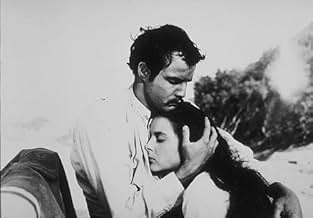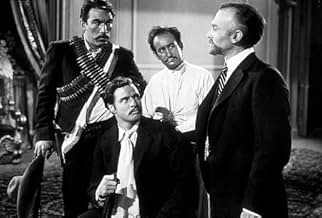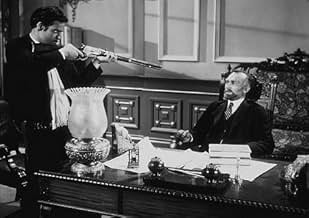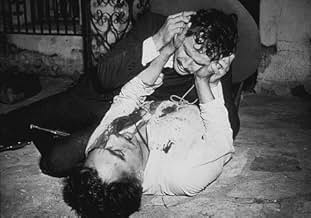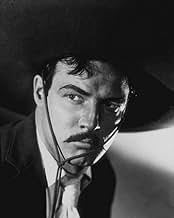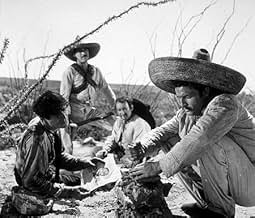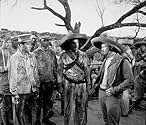VALUTAZIONE IMDb
7,2/10
12.819
LA TUA VALUTAZIONE
La storia del rivoluzionario messicano Emiliano Zapata, che ha guidato una ribellione contro la dittatura corrotta e oppressiva del presidente Porfirio Díaz all'inizio del XX secolo.La storia del rivoluzionario messicano Emiliano Zapata, che ha guidato una ribellione contro la dittatura corrotta e oppressiva del presidente Porfirio Díaz all'inizio del XX secolo.La storia del rivoluzionario messicano Emiliano Zapata, che ha guidato una ribellione contro la dittatura corrotta e oppressiva del presidente Porfirio Díaz all'inizio del XX secolo.
- Vincitore di 1 Oscar
- 3 vittorie e 9 candidature totali
Rico Alaniz
- Guard
- (non citato nei titoli originali)
Daniel Armijo
- Undetermined Secondary Role
- (non citato nei titoli originali)
Ross Bagdasarian
- Officer
- (non citato nei titoli originali)
Salvador Baguez
- Soldier
- (non citato nei titoli originali)
Trama
Lo sapevi?
- QuizAnthony Quinn was very disappointed when Marlon Brando was cast as Emiliano Zapata - he thought that with his Latin appearance, he would have been a better choice. To solve the argument, both actors competed to see which of them could urinate furthest into the Rio Grande. Quinn lost the bet, but he won an Oscar for the best supporting actor as Zapata's brother.
- BlooperThe real Zapata never had a hands-on role in executions. While he would order the executions of close aides, he was never present as he could not bear to watch.
- Citazioni
President Porfirio Diaz: These matters take time. You must be patient.
Emiliano Zapata: With your permission, my President, we make our tortillas with corn, not patience.
- Curiosità sui creditiOpening credits prologue: Mexico-1909
A delegation of Indians from the State of Morelos have come to the Capital for an audience with their President, Porfirio Diaz.
- ConnessioniFeatured in Cinefile: Marlon Brando, Wild One (1994)
Recensione in evidenza
Although in fact Emiliano Zapata never became president of Mexico, for the most part this is a pretty good account of the illiterate peasant who became a romantic revolutionary. For this portrayal in his third film Marlon Brando got a second Academy Award nomination for Best Actor, but lost to Gary Cooper for High Noon.
And as a film concerning the turmoil in Mexico during the teen and twenty years of the last century Viva Zapata! is far better than MGM's Viva Villa that starred Wallace Beery. Then again Marlon Brando is a much better actor.
One critical thing that was left out of the story is how much land the Roman Catholic Church held in Mexico. It was not just the rich Estancias that kept the masses in Mexico in peonage, the Church had a really big share of the real estate there. If the story were written today the Church's involvement would be shown. My guess is in the years of the Cold War and the height of Joe McCarthy, no one in Hollywood wanted to make a film that criticized the church in any way. But even a few years earlier the overreaction against the church was done in the John Ford film, The Fugitive which takes place within 10 to 20 years after Zapata died.
Zapata as played by Brando may be illiterate, but he is possessed of a simple eloquence and a charisma that made him a revolutionary figure, in the same manner Che Guevara became forty years later. He tries hard to hold to the ideals of the revolution, but finds as most do that tearing down a government is relatively easy, building one from scratch is a task that has defeated many.
Anthony Quinn plays Emiliano's swaggering brother Eufemio who's not quite as idealistic as Brando. Quinn received first Academy Award for Best Supporting Actor for the part. Quinn fills the screen with his bluster when he's on, it provides a perfect counterpoint to Brando's more idealistic role.
The guy who never gets praise for his performance is Joseph Wiseman. Wiseman, a product of the Actor's Studio in New York like Marlon Brando. This is a man whose type I've come across in numerous endeavors in my life, a professional stirrer of resentments. He's not happy unless there's some kind of battle going on. A type mind you that is ultimately dangerous for any movement. He intrigues for the sake of intrigue, but never accomplishes anything. It's a very good job by Wiseman, not often talked about for some reason.
Besides Quinn's Oscar and Brando's nomination, Viva Zapata! got Oscar nominations for Best Art&Set Direction for black and white film, Best music, and Best Screenplay. The last would have been a great honor for John Steinbeck, I'm not sure how many if any writers won a Pulitzer Prize, a Nobel Prize and an Oscar. That's three horse parlay that can't be beat.
For some reason Elia Kazan was overlooked for Best Director, possibly because he had won the year before for A Streetcar Named Desire.
Still Viva Zapata! is a work that stands up very well even with the historical inaccuracies.
And as a film concerning the turmoil in Mexico during the teen and twenty years of the last century Viva Zapata! is far better than MGM's Viva Villa that starred Wallace Beery. Then again Marlon Brando is a much better actor.
One critical thing that was left out of the story is how much land the Roman Catholic Church held in Mexico. It was not just the rich Estancias that kept the masses in Mexico in peonage, the Church had a really big share of the real estate there. If the story were written today the Church's involvement would be shown. My guess is in the years of the Cold War and the height of Joe McCarthy, no one in Hollywood wanted to make a film that criticized the church in any way. But even a few years earlier the overreaction against the church was done in the John Ford film, The Fugitive which takes place within 10 to 20 years after Zapata died.
Zapata as played by Brando may be illiterate, but he is possessed of a simple eloquence and a charisma that made him a revolutionary figure, in the same manner Che Guevara became forty years later. He tries hard to hold to the ideals of the revolution, but finds as most do that tearing down a government is relatively easy, building one from scratch is a task that has defeated many.
Anthony Quinn plays Emiliano's swaggering brother Eufemio who's not quite as idealistic as Brando. Quinn received first Academy Award for Best Supporting Actor for the part. Quinn fills the screen with his bluster when he's on, it provides a perfect counterpoint to Brando's more idealistic role.
The guy who never gets praise for his performance is Joseph Wiseman. Wiseman, a product of the Actor's Studio in New York like Marlon Brando. This is a man whose type I've come across in numerous endeavors in my life, a professional stirrer of resentments. He's not happy unless there's some kind of battle going on. A type mind you that is ultimately dangerous for any movement. He intrigues for the sake of intrigue, but never accomplishes anything. It's a very good job by Wiseman, not often talked about for some reason.
Besides Quinn's Oscar and Brando's nomination, Viva Zapata! got Oscar nominations for Best Art&Set Direction for black and white film, Best music, and Best Screenplay. The last would have been a great honor for John Steinbeck, I'm not sure how many if any writers won a Pulitzer Prize, a Nobel Prize and an Oscar. That's three horse parlay that can't be beat.
For some reason Elia Kazan was overlooked for Best Director, possibly because he had won the year before for A Streetcar Named Desire.
Still Viva Zapata! is a work that stands up very well even with the historical inaccuracies.
- bkoganbing
- 21 apr 2008
- Permalink
I più visti
Accedi per valutare e creare un elenco di titoli salvati per ottenere consigli personalizzati
Dettagli
Botteghino
- Budget
- 1.800.000 USD (previsto)
- Tempo di esecuzione1 ora 53 minuti
- Colore
- Proporzioni
- 1.37 : 1
Contribuisci a questa pagina
Suggerisci una modifica o aggiungi i contenuti mancanti

Divario superiore
By what name was Viva Zapata! (1952) officially released in India in English?
Rispondi

